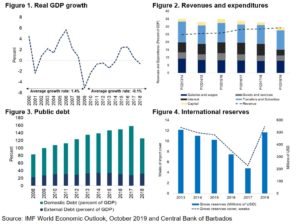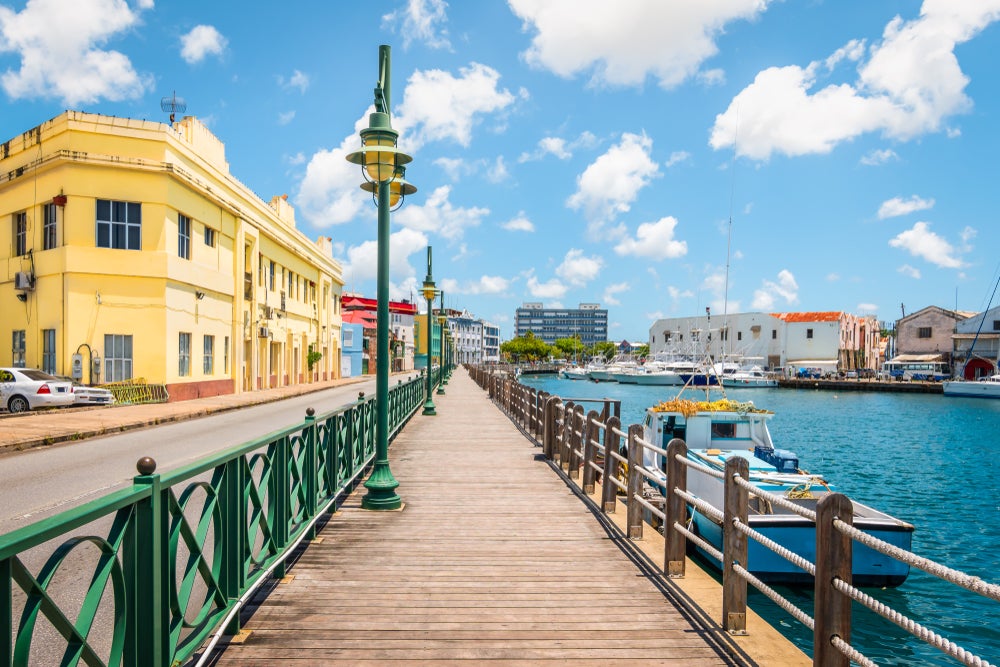It has often been said that times of crisis can often lead to opportunity for change. Barbados is no stranger to this concept, having faced macroeconomic challenges during the past decade, including low growth, high government spending compared to revenue collection, elevated debt levels and declining international reserves (see Figures 1 to 4). This has led to an ambitious set of reforms under the Barbados Economic Recovery and Transformation (BERT) plan, launched in August 2018, supported by an IMF Extended Fund Facility (EFF) program. While the economic landscape is improving with these reforms, the adjustment will continue to take place in the next few years, requiring continued commitment by Government and with continuing strategic support by multilaterals.

The Inter-American Development Bank (IDB) has accompanied Barbados on its development path for the past 50 years and continues to foster a strong partnership with the country. At the heart of our work lies a strategic vision which is regularly revised to reflect the country’s needs and reexamine where we can have the greatest impact. Our latest publication Barbados: A Time for Change: Country Development Challenges presents a summary background analysis that guided the development of the 2019-2023 Country Strategy for Barbados. In this report, we identify four pressing issues that hamper growth in the country and where we consider the IDB Group would have greatest impact:
- Improving the business climate
An enabling business environment is key to promoting economic growth. However, the Barbados economy presents a weak business climate, ranking 128th/190 countries in the Doing Business Report (DBR) 2020, reflecting lower scores than regional peers such as Jamaica (71st), St. Lucia (93rd) and Trinidad and Tobago (105th). High trade barriers, regulation, and burdensome red tape represent key constraints to private sector operations. The report proposes interventions relating to strengthening the regulatory environment and government processes to foster a more open and competitive business climate, promoting innovation and greater use of technologies.
- Promoting greater access to finance
Survey data for Barbados shows that access to finance is a major obstacle to private sector operations. The country ranked 152nd out of 190 countries for access to credit in the 2020 DBR. High collateral requirements, some features of the institutional and regulatory framework, and prevailing gender disparities are highlighted as factors that inhibit accessing credit. These potentially limit investment and private sector development. Recommendations in this regard include expanding the range of financing instruments, particularly for small and medium-sized enterprises and promoting the use of technologies to reduce costs and increase market information.
- Supporting climate sustainability
Barbados is susceptible to the adverse effects of climate change, particularly to increases in atmospheric temperature, sea level rise, and changes in weather patterns. In addition to the material and personal losses generated by extreme weather events, natural disasters could exacerbate the country’s already burdened fiscal stance and hinder economic growth. Natural disasters would be particularly damaging to Barbados’ tourism industry, as most of its infrastructure is located near the coast. Promoting further climate change adaptation and mitigation measures, supporting the adoption of renewable energies to reduce Barbados’ dependence on fossil fuels and exploring new financing mechanisms to confront natural disasters would be key going forward.
- Contributing to a more sustainable macroeconomic and fiscal landscape
The current macroeconomic and fiscal landscape has been unsustainable, hindering investor confidence and weakening governance indicators. Both macroeconomic and fiscal challenges, as well as the current economic reforms, have externalities on the rest of the economy and thus on development. Given this constraint, the Country Development Challenges report suggests continuing implementing reforms to State Owned Enterprises, supporting the underlying structures for sound public financial management and prioritizing a tax expenditure reform.
Barbados faces a time of great challenges but also a time for change. Advancing reforms in the four highlighted areas could be essential to boost the economy to return it to a long-term sustainable growth path. Building on Barbados’ strengths and achievements, we at the IDB stand ready to continue supporting these efforts through financing, technical support and analytical insights.
In this Improving Lives in The Caribbean Podcast Barbados Country Representative, Juan Carlos De la Hoz Vinas and Country Economist, Laura Giles Álvarez discuss the findings and importance of the Country Development Challenges publication with Golda Lee Bruce.
You can check out more of our podcasts in the Improving Lives in the Caribbean series here.


Leave a Reply